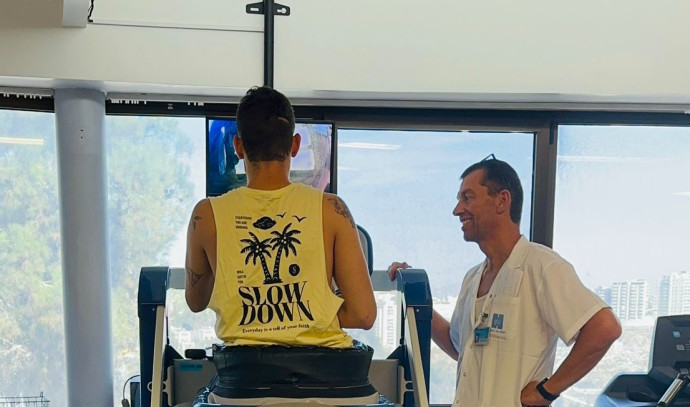Dvir is a Nahal Brigade combat medic who lives with his family in Gush Etzion. During the first days of the war against Hamas, shrapnel from a mortar shell hit his leg.
Despite being wounded and applying a tourniquet to his leg, he continued to help everyone around him and even managed to deliver medical equipment to his wounded comrades as bullets whistled overhead.
With the arrival of more soldiers to the area, Dvir, 22, was flown by helicopter to Jerusalem’s Hadassah-University Medical Center in Ein Kerem and rushed to receive urgent treatment from specialists in surgery, orthopedics, neurology, and blood vessels.
Amid all the fighting and concern for his friends, he hardly noticed that shrapnel had also hit his head.
After undergoing complex surgery on his leg and being treated for the shrapnel in his head, Dvir was transferred to Hadassah’s rehabilitation department at Mount Scopus in a wheelchair.
He is being retaught how to walk on an anti-gravity rehabilitation device that simulates a zero-weight environment, similar to those used by NASA for astronauts.
“When I train on the device, I feel as if I am walking like before, before the injury,” Dvir said.
“Here I am, already fighting to be like I was before my injury,” he said. “Every day, with the physical therapy and the use of the devices I train on, I make more progress and am already walking with crutches. Only when I get off it do I remember that I’m not there yet. But I’m fully on my way to walking with both feet independently. There is no other option for me.”
NASA and Israel work hand-in-hand
Prof. Isabella Schwartz, director of the hospital’s rehabilitation department, said the device, the first of its kind, was imported from the US.
“It gives the staff amazing therapeutic options,” she said. “Dvir steps a little and floats with air flowing from below, allowing him to step on his leg in an incomplete, measured, and supervised manner almost immediately after surgery. His progress in rehabilitation is much faster than what we have known so far.”
The device protects patients from all sides and guides their steps on a walking track, Schwartz said.
“Over time, and at the pace of each patient’s personal progress, we increase the weight we allow him to step on,” she said. “This gradual treatment allows for a more efficient and correct rehabilitation. Dvir shows an admirable determination in the struggle to get back on his feet. This determination and the desire to move forward is an inspiration to everyone around him.”
The device, which was first used at NASA, was bought with a donation from Hadassah International-Israel.“This technology definitely proves itself in the rehabilitation of various types of injuries and wounds that limit or prevent walking, such as muscle weakness or balance problems,” Schwartz said.
Sports injuries can also be rehabilitated with anti-gravity, she said, adding that the device is used by members of the Real Madrid soccer team and elite tennis players.




